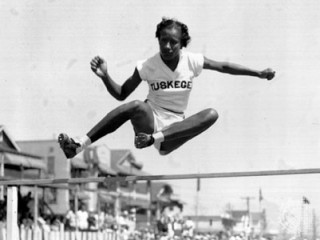
Alice Coachman biography
Date of birth : 1923-11-09
Date of death : -
Birthplace : Albany, Georgia, USA
Nationality : American
Category : Sports
Last modified : 2010-07-08
Credited as : Track and field athlete, ,
22 votes so far
Alice Coachman became the first black woman of any nationality to win a gold medal at the Olympics with her victory was in the high jump at the 1948 Summer Games in London. Coachman broke jump records at her high school and college, then became the U.S. national high jump champion before competing in the Olympics. She is also the first African-American woman selected for a U.S. Olympic team.
Coachman was born the middle child to a family of ten children in rural Georgia, near the town of Albany. Her parents were poor, and while she was in elementary school, Coachman had to work at picking cotton and other crops to help her family meet expenses.
Her athleticism was evident, but her father would whip her when he caught her practicing basketball or running. "Back then," she told William C. Rhoden of the New York Times in 1995, "there was the sense that women weren't supposed to be running like that. My father wanted his girls to be dainty, sitting on the front porch."
Coachman, however, continued to practice in secret. Unable to train at public facilities because of segregation laws and unable to afford shoes, Coachman ran barefoot on the dirt roads near her house, practicing jumps over a crossbar made of rags tied together.
When Coachman was in the seventh grade, she appeared at the U.S. track championships, and Tuskegee Institute Cleveland Abbot noticed her. Abbot convinced Coachman's parents to nurture her rare talent. Reluctantly at first, her parents allowed her to compete in the Tuskegee Institute relay in the 1930s, where she broke first high school, and then collegiate records by the time she was 16 years old. She went on to win the national championships in the high jump, and 50 and 100 meter races as well.
Coachman also sang with the school choir, and played in several other sports just for fun, including soccer, field hockey, volleyball and tennis. She also swam to stay in shape.
Coachman's biggest ambition was to compete in the Olympic games in 1940, when she said, many years later, she was at her peak. But World War II forced the cancellation of those games and those of 1944. The war ended in 1945, clearing the way for the 1948 Summer Games in London. In 1946, Coachman became the first black women selected for a U.S. Olympic team, in the first Olympiad since the 1936 Games in Nazi Germany.
Winner at Wembley
Illness almost forced Coachman to sit out the 1948 Olympics, but sheer determination pulled her through the long boat trip to England. Until Coachman competed, the U.S. women runners and jumpers had been losing event after event.
She made her famous jump on August 7, 1948. At age 25, she launched herself into the record books in front of 83,000 spectators, becoming the first woman of African descent to win an Olympic gold medal.
The English had pinned their hopes on high jumper D. J. Tyler. Both Tyler and Coachman hit the same high-jump mark of five feet, 6 1/4 inches, an Olympic record. But Tyler required two attempts to hit that mark, Coachman one, and so Coachman took the gold, which King George VI presented her. Coachman's record lasted until 1956.
Coachman returned home a national celebrity. She was honored in meetings with President Harry Truman and former First Lady Eleanor Roosevelt, and with a parade that snaked 175 miles from Atlanta to Albany, with crowds cheering her in every town in between. She also became the first African-American woman to endorse an international product when the Coca-Cola Company featured her prominently on billboards along the nation's highways. Back in her hometown, meanwhile, Alice Avenue and Coachman Elementary School were named in her honor.
Coachman's Olympic gold medal paved the way for the generations of African-American athletes. "I think I opened the gate for all of them," she told the Atlanta Journal-Constitution's Karen Rosen in 1995. "Whether they think that or not, they should be grateful to someone in the black race who was able to do these things."
After graduating from Albany State College, Coachman worked as an elementary and high school teacher and a track coach. She married and had two children.
In 1994, Coachman founded the Alice Coachman Track and Field Foundation. This organization helps develop young athletes, and to help former Olympic athletes to establish new careers.
Great Olympic Athlete
Choosing to stay largely out of the spotlight in later years, Coachman, nonetheless, was happy to grant media interviews in advance of the 100th anniversary modern Olympic games in 1996, held in Atlanta. She told reporters then that her mother had taught her to remain humble because, as she told William C. Rhoden of the New York Times in 1995, "The people you pass on the ladder will be the same people you'll be with when the ladder comes down."
She also advised young people with a dream not to let obstacles discourage them. Instead, she advised, listen to that inner voice that won't take "no" for an answer. "Guts and determination," she told Rhoden, "will pull you through."
AWARDS
1939, Wins her first Amateur Athletic Union competition; 1939-48, Wins national high jump championship every year; 1946, Named to the women's All-America track and field team for 1945; 1946, Becomes first African-American woman selected for an Olympic team; 1948, Wins gold medal in the high jump at the Olympics, becoming the first black woman to win Olympic gold; 1975, Inducted into the National Track & Field Hall of Fame; 1996, Honored as one of the 100 Greatest Olympic Athletes.
















